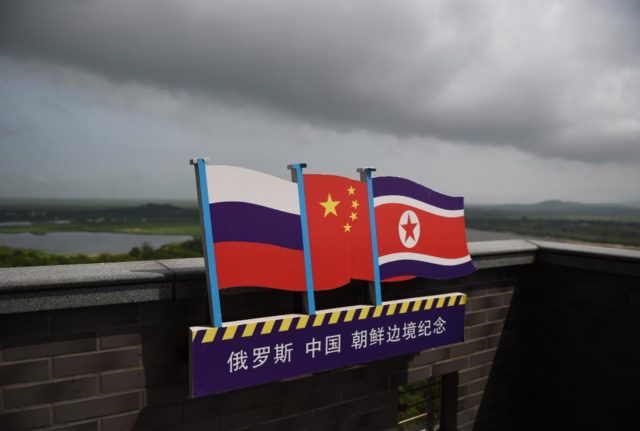
Russia’s Endless Quest for Recognition in Korea
Publication: Eurasia Daily Monitor Volume: 15 Issue: 150
By:

Ever since the Six-Party Talks to denuclearize North Korea began in 2003, Russia has relentlessly searched for a way to prove its importance to all the other players, which also include South Korea, Japan, the United States and China. Indeed, a major driver of Russian foreign policy regarding both Koreas has been this quest for acknowledgement as a great regional power. Specifically, Moscow has sought to prove that it has a major and indispensable role in resolving the thorny issues of a peace settlement and denuclearization of the Korean peninsula (see EDM, May 14).
As part of this policy, Russia continues to seek economic influence in North and South Korea, a drive that also leads it to be a habitual violator of United Nations sanctions. Perhaps unsurprisingly, therefore, its official line is that sanctions, which it deems to be objectionable if not illegal and not approved by the UN Security Council, should go away (Mid.ru, September 27). Added to this is the fact that Russia’s growing dependence on China (see EDM, May 17, 2017; April 18, 2018) has fostered a growing subordination to Beijing’s objectives and acceptance of its leading role vis-à-vis North Korea. Third, Moscow’s inveterate anti-Americanism leads it to reflexively blame Washington (Mid.ru, September 27) for Pyongyang’s nuclearization, deceitfulness and general obduracy. These factors, along with Moscow’s misrule over and failure to stimulate the economy of the Far East region, help explain why, despite its efforts, the Russia continues to play second fiddle in Korea (Valdaiclub.com, August 22).
These points of policy were once again in evidence during Foreign Minister Sergei Lavrov’s presentation to the UN Security Council session on Korea in late September (Mid.ru, September 27). Lavrov, of course, criticized the US stance. But beyond this, Russia, China and North Korea released a joint statement insisting that all issues relating to Korea be solved in a peaceful, political, and diplomatic way. More importantly China and Russia agreed to North Korea’s demand that issues be resolved in a “step-by-step” way, which will only lengthen the process of denuclearization, if it ever occurs. Therefore, Moscow, Beijing and Pyongyang argued that precedence should be given to the confidence measures between both Koreas that are now occurring. Likewise the three parties recognized the need for the UN “to activate the process of adjusting sanctions upon the DPRK [Democratic People’s Republic of Korea—the official name for North Korea] in time.” The three governments also called for easing sanctions in response to “significant and practical steps” that North Korea has taken in denuclearization (Kcnawatch.co, October 10).
However, since North Korea has not yet denuclearized in any practical sense, this statement telegraphs China’s efforts to make sure that Washington (and Pyongyang) takes it views into account. Furthermore, the joint statement reveals Moscow’s true objectives and intentions. While Russian diplomacy toward Japan and South Korea seeks to underscore its peaceful intentions (Yonhapnews.co.kr, August 2), in fact Moscow has effectively committed itself against denuclearization by endorsing Pyongyang’s preferred course, which demands a peace treaty in advance of any efforts to give up nuclear weapons. Under the circumstances, Lavrov’s assertion that Korean reunification is not out of the question, that Russia is drafting a proposal in favor of it at the UN Security Council, and that his government stands ready to help both Koreas restore economic and infrastructural links (TASS, September 26) is nothing but more of the same special pleading. Indeed, at the same time as it makes these proposals, Moscow continues to violate the sanctions it voted for in the UN and which it is urging be scrapped.
Under the circumstances, it is clear why the US continues to brush off Russia’s endless efforts to pose as a mediator or offer what diplomats call its “good offices” to the process. Those same double-dealing gestures by Moscow also help explain why Pyongyang, as of this writing, has yet to set a date for a summit between its leader, Kim Jong-un, and Vladimir Putin. Kim has already pocketed Russia’s support without paying any price for it, so he only has to worry about China, the US and South Korea. And South Korea has taken upon itself the role of mediator between Kim and the Donald Trump administration. Moreover, Trump is also planning a second summit with Putin, while indicating that the White House has not set any kind of deadline for North Korea’s denuclearization. Finally, since Beijing and Moscow will stand with Kim to resist international pressure for denuclearizing in advance of a peace treaty or an end to sanctions, the North Korean leader need not exert himself or spend any government resources on reciprocating Seoul’s or Washington’s overtures until he obtains what he wants.
Consequently, having proven yet again its submission to Beijing on the North Korean issue, it is difficult to see what benefits Moscow draws from this arrangement except for the satisfaction of irritating Washington. And despite fawning Russian analyses to the contrary, this is probably not a sign of the great success of Russia’s wider “pivot to Asia” policy.



